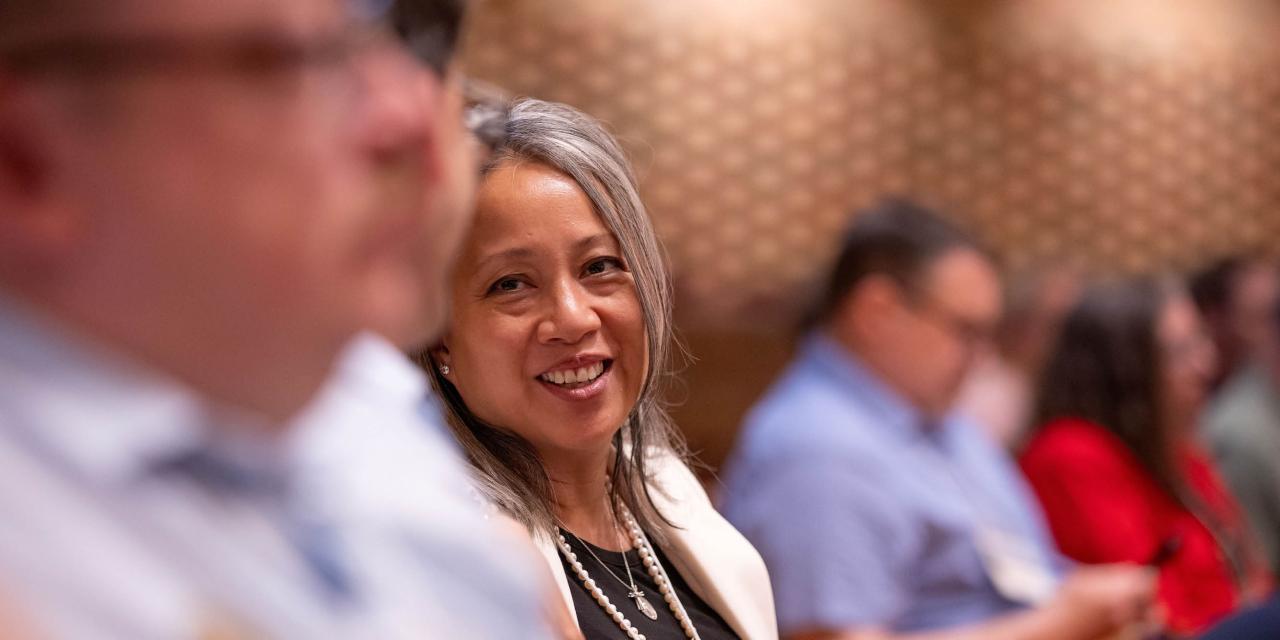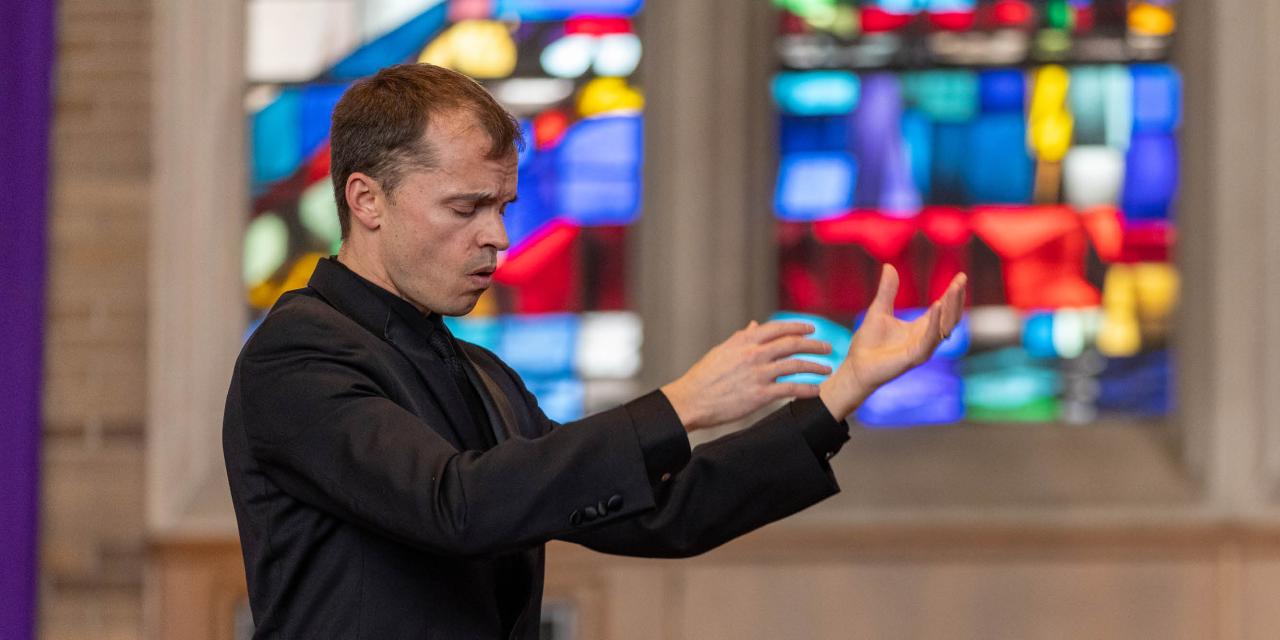Mark Stover is director of choral activities at Calvin University in Grand Rapids, Michigan. He has taught music and directed choirs at the University of Michigan and St. Olaf College in Northfield, Minnesota. Stover has led community choirs; regularly guest conducts at concerts, festivals, and all-state gatherings; and premiered social justice choral pieces in Norway and at New York City’s Lincoln Center. In this edited conversation, Stover discusses how to pastor people and seek justice through choral music.
Why do you see choral music as a type of pastoral ministry?
My sense of calling is to pastor people. It’s just that I do it from a conductor’s podium. Music is a beautiful way to create space for relationships and cultivate the whole person—body, mind, spirit, and voice. Music connects on a heart level in a way that many disciplines don’t. It can overcome some barriers that pulpits present.
Whether I’m teaching and conducting in a major public research university, a Christian liberal arts college, a church, or a community choir, that thread of vocational pastoral identity persists. I grew up in a Presbyterian Church (USA) congregation in Boulder, Colorado, and connected with the Lutheran world because I wanted to go to a college with a really great choir. For me, that was St. Olaf College. There I met conductor Dr. Anton Armstrong. I sang in his choirs, and he was the primary mentor of my master’s in conducting at Luther Seminary in St. Paul, Minnesota. Armstrong is still the principal mentor of my life today—not just in music, but in all of life. It’s really special to be at Calvin University, where Anton Amstrong had such pastoral influence in the 1980s on Calvin’s choral music.
In what ways do you do pastoral ministry through choral music?
Choral programming and repertoire are wonderful tools to prompt conversations. I see rehearsal as a means of spiritual formation. The uniqueness of choral music is text. If you memorize a beautiful text, you will know it for the rest of your life. You are shaped so strongly by what you consume, which could be powerful hymnody or a text on a pastoral issue. Whether you agree with the text or not, singing it together opens up space for trust and dialogue.
In my first months at Calvin University, I could already see how quickly students were connecting to the culture I’m seeking to instill. I really appreciate seeing students connect to songs in rehearsal. Sometimes that’s through a comment like “This song reminded me of how I struggle with a certain issue.”
Do you have tips on how to create a choral culture?
The most important way to create a culture of vulnerability and trust is to model it. In the Calvin Capella choir, we literally take time out of rehearsal for students to lead devotions and take prayer requests. In a public school, you could instead take time out to check in and learn how choir members can support each other. I often make spontaneous comments about a song’s background and theology. And I give permission for choir members to do likewise. We talk about how it’s OK to sing a text that you might not totally agree with.
Some people wonder whether my choirs will do as well musically when we take rehearsal time to talk about pastoral issues. Absolutely! Pastoral practices season choirs. The more a choir is connected on a heart level, the more deeply they sing. I am passionate about musically expressing God’s wide welcome in the gospel.
Pastoral practices season choirs. The more a choir is connected on a heart level, the more deeply they sing. I am passionate about musically expressing God’s wide welcome in the gospel.
Do you have a story of choral relationships leading to meaningful dialogue?
I came to Calvin after six years at the University of Michigan, where I taught conducting and directed three choirs. On a Men’s Glee Club choral tour, while waiting for an order of french fries, a student felt comfortable enough with me to open up about some of his mental health issues.
This conversation led to an opportunity for the Glee Club to commission three new pieces on mental health advocacy. The result was the three-song choral suite You Are Enough: A Mental Health Suite, by Broadway composer Aron Accurso. The premier included quotes gathered from young people by the MyVoice national poll of adolescents and an audience talkback after the concert. Now that music is being performed all around the world. I see the whole process as a way that the Holy Spirit works.
How have you pursued social justice through choral music?
While teaching at St. Olaf College, I had the privilege to connect with Amanda Kate Weber, another expert in the Lutheran choral world. She founded Voices of Hope, a choir made up of women incarcerated at the federal prison in Shakopee, Minnesota (Minnesota’s only women’s prison). Amanda invited me to bring in choirs from St. Olaf and the Twin Cities community to sing together. Bringing choirs into prisons can create communities with people who are incarcerated. Prison choirs bring art, beauty, and meaning into a context designed to dehumanize.
In 2016–17, Amanda and I co-taught a weekly evening course I designed on music and social justice. My St. Olaf students and I went into the prison to learn with Voices of Hope choir members. There’s such a hunger to learn about and sing songs of social justice. St. Olaf still offers a course on music and social justice. I would love to teach a similar course at Calvin University and partner with the Calvin Prison Initiative and music therapist Erinn Epp.
What did you learn from the incarcerated choir members?
Women often end up in prisons because of domestic abuse situations. Sometimes they are forced to sell drugs or to do things that catalyze offending acts. Whenever my choirs sing a spiritual or something from a community that’s been marginalized, we are dealing with social justice. So if we sing a spiritual, I make sure members know the horrors of slavery out of which emerged spirituals of unspeakable hope in God.
How do you decide whether a social justice song is appropriate to the choir’s age or social context?
Even elementary school choirs can sing “We Shall Overcome.” The keys—whether you are singing about bullying, police violence, creation care and climate justice, refugees, or LGBTQ+ issues—are to teach the song’s origin story and to know your choir. You can’t teach this music divorced from a curriculum that supports it. So if your choir is singing “We Shall Overcome,” then you also teach them about the U.S. civil rights movement. Depending on choir members’ ages, you may want to send a letter to parents to explain why the choir is talking and singing about a particular social justice issue.
What can or cannot be sung in a given context requires that you know the people in your choir and their place in the larger cultural context. You have to deal with social justice songs with great care and forethought. It’s important to give permission for people to disagree about a song’s viewpoint. This helps model a priority to make space for all perspectives.
What resources can you recommend for pursuing social justice through music?
The Justice Choir Songbook is a free web-based collection sponsored by Westminster Presbyterian Church in downtown Minneapolis, Minnesota. Its songs and arrangements are mostly new and speak to climate change, racism, xenophobia, misogyny, and other barriers to welcoming all God’s children. These songs express a diversity of perspectives that people in churches hold, so it’s important to know your congregation well when choosing a song.
My doctoral research focused on renowned Black composer and artist Ysaÿe M. Barnwell. I also spent time learning the music of Undine Smith Moore, William Grant Still, and social justice choral music of the 1970s and 1980s. With various choirs, I’ve helped commission, premier, or tour with choral music, such as Kim André Arnesen’s “The Stranger” to raise global awareness of refugees and immigrants and “To Repair” by Tesfa Wondemagegnehu.
Learn More
Notice the diversity of songs and composers in Mark Stover’s first Capella Choir concert at Calvin University. For longer social justice pieces, Stover suggests “Justice Symphony,” by Damien Geter; Considering Matthew Shepard: An Oratorio, by Craig Hella Johnson, a St. Olaf grad; and Joel Thompson’s “Seven Last Words of the Unarmed” and companion resources. The American Choral Directors Association recommends several choral anthems with social justice themes.

